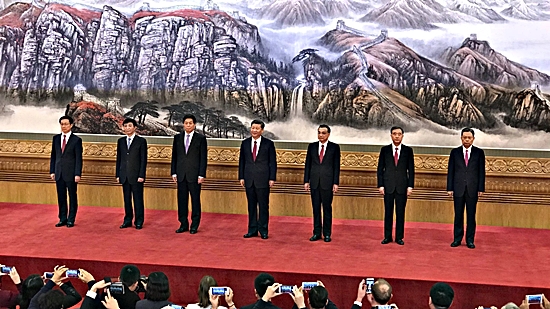
It’s bad to belong to the Chinese Communist Party. The CCP is a bad organization that does a lot of bad things, like systematically oppress and murder people on a wide scale (for details, see the rest of this site). It’s worse to be among the top ranks of the CCP, because the top CCP officials are the people most responsible for developing the oppressive and murderous policies and for implementing these policies.
The CCP commits a lot of sins. Is one of them that its upper echelons include too few women?
Erin Hale and Minglu Chen seem to think so.
According to commentary by Hale at the Al Jazeera site (“China’s Communist Party at 100: Where are the women?,” June 30, 2021), it’s a darn shame that so few women have managed to ascend to the top-butcher ranks of the CCP.
Despite all the upheaval over the past century, “one thing remains the same,” Hale huffs.
Men continue to dominate political power….
At the most recent National Congress of the CCP in 2017—the event is held every five years—women made up just 83 of 938 elite delegates, or fewer than 10 percent overall, according to China Data Lab, a project of the University of California San Diego.
There is not a single woman in the party’s most elite inner circle, the seven-member Politburo Standing Committee….
Party members make up 37.5 percent of village and neighbourhood-level committees, but that number falls in leadership positions, according to ChinaFile, the online magazine of the Centre on US-China Relations at the Asia Society.
Women occupy just 9.33 percent of county-level posts as head of government or party secretary, falling to 5.29 percent in cities and 3.23 percent at the provincial level.
Proposed explanations include pro-male bias, gender stereotypes, a patriarchy determined to preserve its power, etc.
Hale also observes that men vastly outnumber women in the politics of other East Asian countries, too. So this isn’t a syndrome unique to China.
Writing a couple of years after Hale’s lament, Minglu Chen, a professor at the University of Sydney, shaking her head at the dearth of women in the 2022 National Congress, echoes Hale’s sentiments in a piece for East Asia Forum.
It is long past time for the CCP to live up to Mao Zedong’s rhetoric on women’s empowerment. Introducing an effective gender quota system, addressing barriers such as recruitment criteria and educational disparities, diversifying the CCP and providing more opportunities for women in leadership positions are crucial steps towards increasing female representation in Chinese politics.
It doesn’t seem to have occurred to Hale and Chen that women who are not leaders in the Chinese Communist Party—are not elite delegates of the National Congress, are not members of the Politburo Standing Committee—have escaped the moral culpability that they would have incurred by cooperating with and advancing the goals of these cogs of the machinery of state.
Women deprived of opportunities to climb to such heights of power may well be complicit in what the Chinese government does in other ways. But they are at least not leading the way in the CCP. Thanks to the prejudice and power-clinging of the male power holders and whatever other reasons, many women have escaped this moral fate who might not have escaped it had the CCP always been a stickler for gender equity.
No matter who you are and what your physical attributes are, you should not be helping the Chinese Communist Party do its thing.





